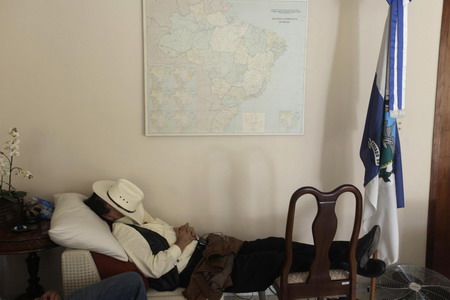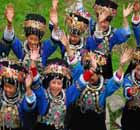America
Zelaya in limbo, says democracy 'dead' in Honduras
(Agencies)
Updated: 2009-12-04 10:27
|
 Honduras' ousted President Manuel Zelaya sleeps inside the Brazilian embassy in Tegucigalpa September 22, 2009. [Agencies] |
TEGUCIGALPA: Honduras' deposed leftist president, Manuel Zelaya, said on Thursday that democracy in the country was "dead" after lawmakers who backed his ouster in a June coup voted to block his return to power.
In a decision that disappointed Washington, Honduras' Congress resisted international pressure and voted 111-14 on Wednesday against Zelaya's reinstatement, throwing his future into question as he remains camped out inside the heavily guarded Brazilian Embassy.
A US-brokered deal between Zelaya and de facto leaders who took power after the coup left it up to Congress to decide if he could finish out the last few weeks of his presidency before his term ends in January.
The congressional vote reaffirmed lawmakers' June 28 decision to strip Zelaya of his powers after he was sent into exile at gunpoint. Honduras' de facto leader, Roberto Micheletti, applauded Congress' decision.
Zelaya had already said he would not return to office under the deal, saying the agreement was not negotiated in good faith and its implementation would amount to a win for the coup leaders.
"Honduran democracy is dead," Zelaya told the local Radio Globo station on Thursday from the embassy where he has stayed since he sneaked back into the country in September.
"This is a mockery of the country's laws. Honduras has no laws any more. Honduras is living in a de facto state," Zelaya said.
Opposition candidate Porfirio Lobo won Sunday's presidential election, which was scheduled before the coup.
Valenzuela said the election was carried out in an "open and transparent manner."
The stance has split the United States from Latin American powers like Brazil and Argentina that say it is impossible to recognize an election organized by a de facto government.
Foreign lenders cut aid to the poor coffee- and textile- exporting country to punish the coup leaders, who are not recognized by any government.
'Important Work Remains'
Valenzuela said the presidential election was only one step toward restoring democracy in the Central American country and urged Honduras to fulfill the other parts of the agreement by creating a national unity government and a truth commission to investigate the coup.
"Important work remains to re-establish a democratic and constitutional order in Honduras and promote national reconciliation in the wake of the June 28 coup d'etat as the status quo remains unacceptable," Valenzuela said.
Lobo -- a wealthy landowner who hails from the country's traditional ruling elite -- seemed to echo the US sentiment.
"If Congress' decision is not accompanied by the agreement's other points, like the unity government and the truth commission, the suffering will continue," Lobo told reporters.
"The completion of this accord will allow the international community to open their doors and normalize relations," Lobo said.
Lobo has avoided questions about Zelaya's fate but may end up offering him some sort of political amnesty to end his state of limbo in the embassy.
The country remains deeply divided by the coup, with Zelaya supporters organizing near daily protests in the capital, although their numbers have dwindled since Micheletti cracked down on marches and pro-Zelaya media outlets.











